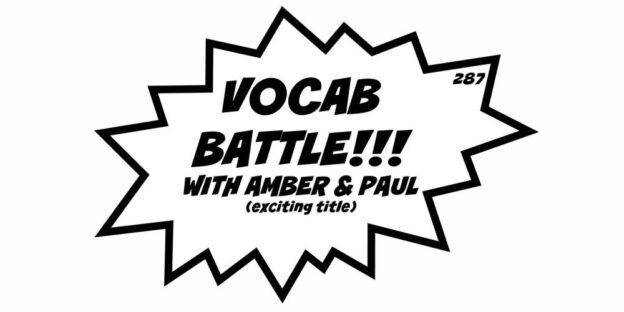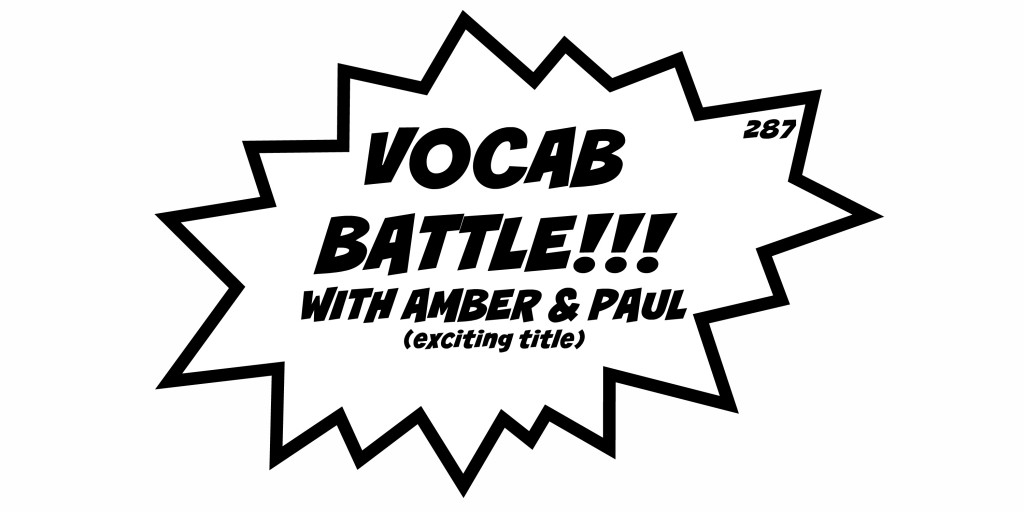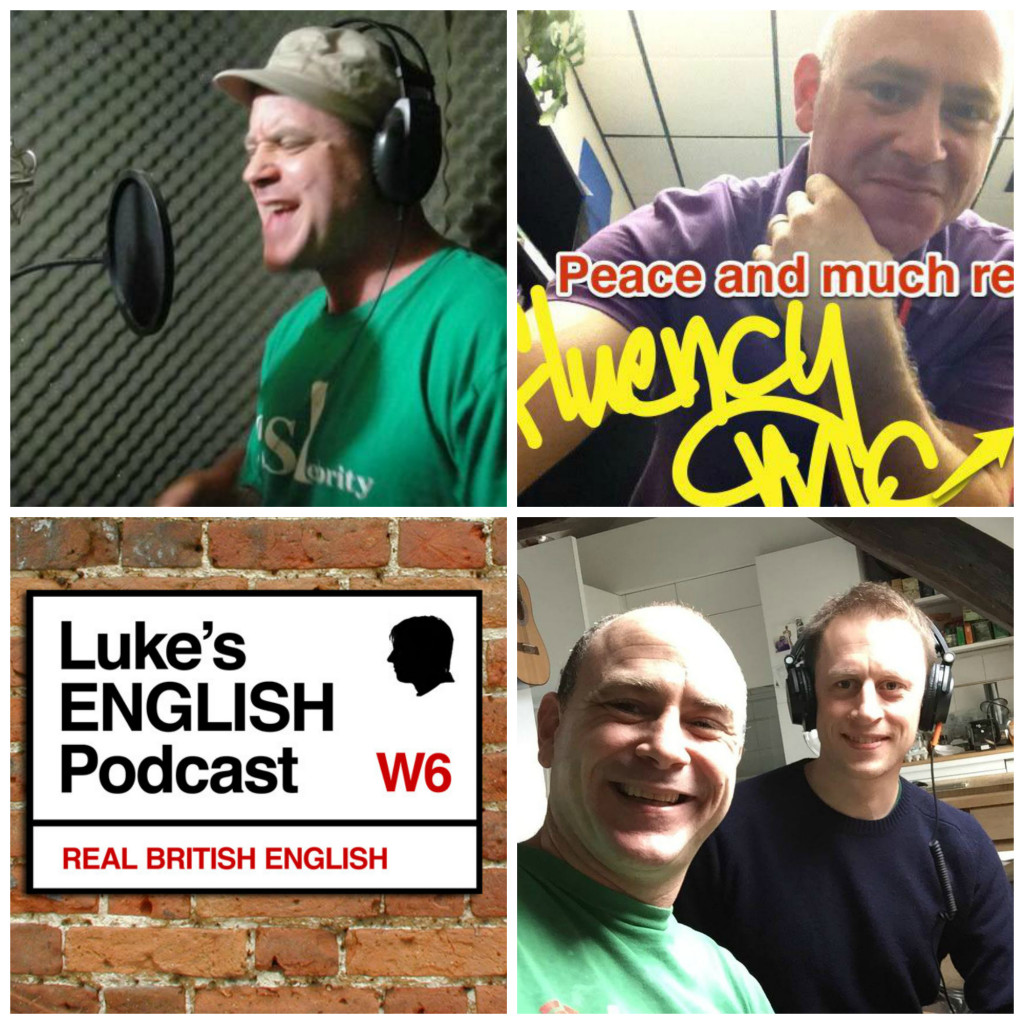Testing my Dad on his knowledge of English, using words that are frequently confused by native English speakers. Will my dad be able to identify the words, spell them and explain the differences? Listen to learn 20 words and phrases which native English speakers often get wrong. You will also hear Dad and me discussing topics such as catching a squirrel, what he would say to Donald Trump and Paul McCartney if he met them, stories of police drug busts at university, how my dad would deal with a zombie apocalypse, and which one is worse – Brexit or Yoko Ono’s ‘singing’? Vocabulary list with definitions and examples available.
![]()
[DOWNLOAD]
Introduction Transcript
About 18 months ago my Dad tested me with his evil gameshow, called “Who wants to be good at English”. I say it was an evil gameshow because I think it was designed for me to fail (although arguably, I didn’t fail, OK!?) It was basically a quiz he created in order to highlight some common mistakes that people make (especially journalists) with certain English words.
You can listen to that, and take the test as well, by finding episode 373 in the archive – or just click here https://teacherluke.co.uk/2016/08/10/373-who-wants-to-be-good-at-english/
So I thought we’d play another game of “Who Wants to be Good at English” but this time I’m asking the questions. My questions are based on an article I found on the Indy100 (an online magazine) written by Paul Anthony Jones which is all about some of the most commonly confused words in English (for native English speakers). Apparently these are some of the words that many English native speakers confuse – meaning they use one word when they should be using another. I wonder if my Dad is able to tell the difference between all of these pairs of words. Let’s see if he really is that clever and articulate. I think he probably is, but let’s see.
As we are playing the game I invite you to join in. Can you guess which words we’re talking about here?
If you don’t know the words, listen carefully because we will define them and then also have a little chat using the words so you can hear them in context.
Also, you’ll hear us talking a little bit about the origin of some of these words, which is quite interesting because it shows how many English words come from latin and in some cases words from other origins like old English and even Turkish.
Check the page for the episode on the website too, where you will see all the words listed with definitions.
https://www.indy100.com/article/ten-of-the-most-commonly-confused-words-in-the-english-language–bJRDKGNwlZ
- Dad, how are you?
- Are you confident that you know English better than most other Brits?
- Did you study latin at school?
- Does a knowledge of latin help with English?
- Do you think it will help you in this test?
10 rounds – 10 pairs of words which are commonly confused.
I will ask you questions – you have to tell me the word I am looking for. I will also ask you for the spelling and pronunciation.
ROUND 1
- If you’re waiting for something with great anticipation, literally to the point that you are having some trouble breathing – for example you’re desperately waiting for the next episode of Luke’s English Podcast – what expression would you use?
- How do you spell that?
- If you go fishing, what do you need in order to catch a fish?
- How do you spell that?
- How are they pronounced?
Answers:
Bate (verb) = abate = become less strong, to suppress. Formal, old fashioned.
The storms had abated by the time they rounded Cape Horn. [VERB]
…a crime wave that shows no sign of abating. [VERB]
To wait with bated breath = to wait eagerly and impatiently
Bait = (noun) – food you put on the end of a fishing line or in a trap in order to catch something
Also – figuratively something which is used in order to catch someone. E.g. ‘clickbait’
(verb) – to put food on a line or in a trap
(verb) If you bait someone, you deliberately try to make them angry by teasing them.
He delighted in baiting his mother. [VERB noun]
Synonyms: tease, provoke, annoy, irritate
According to Oxford Dictionaries, around 1 in every 3 records of the phrase “bated breath” in the Oxford Corpus is spelled incorrectly, as “baited.”
Baited with an I is the same bait that you use when going fishing.
Bated without an I is totally unrelated, and comes from an ancient English word, bate, meaning “to beat down,” “restrain” or “suppress” – it’s the same word we use when we say that a storm has abated – which makes “bated breath” literally “held breath.” (Indy100.com)
Quick Discussion Questions
- Are you currently waiting for anything with bated breath?
- What is the best way to catch a squirrel? How about a crab? What kind of bait should you use?
ROUND 2
- If you see someone that you don’t want to meet or talk to – perhaps a person who you don’t like, or imagine a drunk man in the street who might bother you or even attack you. You’d walk around him, putting space between you and him. What would you give him?
- How do you spell that?
- What word is this often confused with? It’s something that generally happens at the beginning of someone’s life.
- How do you spell that?
- How are they pronounced?
Answers:
Berth (noun) = (nautical term) originally means “sea room” – the room that a boat needs for mooring, but also generally room or space for ships. So, to give a wide berth in terms of shipping – you can imagine needing to go around a rocky point or perhaps another ship with lots of space, to avoid any possible collision.
Give something a wide berth = avoid it, go around it, put distance between you and it.
Birth / Give birth (to someone) = have a baby
Quick Discussion Questions
- If you saw these people in the street, would you give them a wide berth or would you go up to them?
- Donald Trump
- Harvey Weinstein
- Kim Jong Un
- Madonna
- Boris Johnson
- Paul McCartney
- Were you there when Mum gave birth to me? What was it like for you?
ROUND 3
- What word is a synonym of advice – for example legal advice? It can also be a verb, meaning to give advice. (also another noun – it can mean the lawyer too)
- How do you spell that?
- What about a group of people brought together to make decisions? E.g. a local administrative group who make decisions about how the local town should be run.
- How do you spell that?
- How are they pronounced?
Answers:
counsel (noun) = advice
[formal]
He had always been able to count on her wise counsel.
The community requested his counsel on various matters.
counsel (noun – person) = a lawyer
The defence counsel warned that the judge should stop the trial.
counsel (verb) – to give advice
[formal]
If you counsel someone to take a course of action, or if you counsel a course of action, you advise that course of action.
My advisers counselled me to do nothing. [VERB noun to-infinitive]
The prime minister was right to counsel caution about military intervention.
Council and counsel can both be used as nouns (in the sense of “an assembly of people” and “good advice or direction”) but only counsel with an SE can be used as a verb (“to give advice or direction”).
Both are derived ultimately from Latin, but while council comes from the Latin word calare, meaning “to call or proclaim officially” (which makes it an etymological cousin of calendar), counsel with an S comes from the same root as consult. So while a council is “called” together, you might “consult” someone for their good counsel. (Indy100.com)
Quick Discussion Questions
- Have you ever needed to take legal counsel for anything work related?
- Have you ever been asked to provide counsel on any local matters?
- Is there a local council where you live?
ROUND 4
- As a teacher, sometimes it’s necessary to draw out certain language from my students. Often if I’m teaching some words, or doing an introduction, rather than just lecturing them about a subject, it’s a good idea to get them to give me certain words – it tends to keep the students involved and makes them a bit more productive, and it also allows you to see which words they know and don’t know. What verb means to get a piece of information, a word or a reaction from people by asking certain questions?
- How do you spell that?
- What adjective is a synonym of ‘illegal’ and means ‘not allowed or approved by a rule’.
- How do you spell that?
- How are they pronounced?
Answers:
Elicit (verb)
Illicit (adjective)
The E of elicit is the prefix ex–, which is here used to form a word bearing some sense of “out” or “from”, like exhale and exterior. The –licit in both words is also entirely unrelated: in illicit it comes from the Latin verb licere, meaning “to allow” (as in licence), whereas in elicit it derives from the Latin lacere, meaning “to lure” (which is also where the word delicious comes from). (indy100.com)
Quick Discussion Questions
- When you were growing up in the 60s, were you ever given information about illicit drugs? Did many people use illicit substances at that time?
- The Shakespeare play “Macbeth” – what feelings do you think it elicits in its audience? What’s the main feeling that it elicits?
- How about films. How do they elicit reactions from the audience? Think of a horror film for example.
ROUND 5
- What is the difference between the word ‘affect’ (with an ‘a’) and ‘effect’ (with an ‘e’)?
- How are they pronounced?
Answers:
Affect (verb)
Effect (noun)
The root of both is the Latin facere, meaning “to make”, but while the E of effect comes from the same prefix as elicit, ex–, the A of affect comes from the prefix ad–, which is used to form words bearing some sense of “towards”, “on” or “a coming together” like adjoin or ashore. To affect ultimately means to have an effect on something, while an effect is an outcome. (indy100.com)
Quick Discussion Questions
- How does wine affect you? Does it affect you in the same was as it affects other people?
- What are the good and bad effects of wine?
ROUND 6
- How would you describe someone whose hair is going grey, making them look quite cool and perhaps even quite tough. It’s the sort of word you might use to describe a police detective or a cowboy who is getting older and has had some tough experiences, which you can see in his greying hair – but he’s not really old yet, just experienced.
- How do you spell that?
- What’s another word for a brown bear? They type of bear you might come across in Yellowstone National Park in the USA. They’re brown but they have some grey-ish hair around the shoulders, head and ears.
- How do you spell that?
- What adjective would you use to describe the disgusting or explicit details of a murder. Something which is very unpleasant and that would be horrible to look at.
- How do you spell that?
Answers:
Grizzled (adj) = going grey (usually used in a literary context)
Grizzly (adj) = also going grey, like ‘grizzled’ but usually ‘grizzly’ is just the word for a type of brown bear
Grisly (adj) = extremely unpleasant and horrible
If something is horrible to look at then it’s grisly, not grizzly. Grizzly with two Zs is a descendent of the French word for “grey”, gris, and comes from the older use of grizzled to mean “grey-haired” (despite grizzly being another name for a brown bear, of course).
Grisly with an S is a descendent of grise, a Middle English word meaning “to shudder with fear”. (Indy100.com)
- What kind of movie star would you rather watch in a film – a fresh faced young-looking hero or a grizzled hero? Can you think of any examples?
- Have you ever seen a grizzly bear?
- Do you think the news should report all the grisly details of a story?
ROUND 7
- Imagine there’s going to be a zombie apocalypse. It’s a terrifying thought. It would be a good idea to collect and store lots of food, drink and supplies. To stockpile things, and hide them so that nobody else can find and use them, but you’ll be able to keep them and survive. What verb am I thinking of?
- How do you spell that?
- Now imagine loads of zombies in a huge group, or in fact many large groups of zombies surrounding your house or out in the street. What noun could you use to describe these groups of the undead. Of course this word could also be used to describe groups of ordinary people too, but it sounds a bit negative – frightening or unpleasant, perhaps.
- How do you spell that?
- Pronunciation?
Answers:
To hoard something (verb) = If you hoard things such as food or money, you save or store them, often in secret, because they are valuable or important to you.
They’ve begun to hoard food and gasoline and save their money. [VERB noun]
The tea was sweetened with a hoarded tin of condensed milk. [VERB-ed]
A horde of something (noun) = a large group of people, usually considered quite threatening or scary.
This attracts hordes of tourists to Las Vegas. [+ of]
…a horde of people was screaming for tickets.
Around a quarter of all the citations of the word hoard (a noun meaning a store of valuables, or a verb meaning “to accumulate” or “stockpile”) in the Oxford English Corpus are incorrect, and should really be horde (a large group of people).
In English, hoard is the older of the two and derives from an Old English word for treasure – wordhoard was an Old English word for a person’s vocabulary. Horde is completely unrelated, and has an E on the end of it because it comes from an old Turkish word, ordu, for an encampment. (Indy100.com)
Quick Discussion Questions
- What would you do if you found out that there would be a zombie outbreak? What kinds of things would you hoard?
- What would you do if your house was surrounded by a horde of zombies?
ROUND 8
- Imagine a road which is full of twists and turns. How would you describe it? How about a piece of writing or perhaps a process which is really complicated and time consuming. Which word would you use to describe those things?
- How do you spell that?
- Which adjective could you use to describe something that causes great pain and suffering?
- How do you spell that?
- Pronunciation?
Answers:
Tortuous = twisting and turning (road), complex and time consuming (process, writing)
The only road access is a tortuous mountain route.
…these long and tortuous negotiations aimed at ending the conflict.
The parties must now go through the tortuous process of picking their candidates.
Torturous = like torture – very painful and agonising.
This is a torturous, agonizing way to kill someone.
Confusion often arises between these two not only because of their similar spellings, but because something that’s tortuous can often seem torturous.
Tortuous without the extra R means “full of twists and turns”, and is derived from a Latin word, tortus, for a twist, or a twisting, winding route. If something is torturous then it’s akin to torture, hence the extra R. (Indy100.com)
Quick Discussion Questions
- Would you like to be involved in the Brexit negotiations? Why not?
- You wrote a book once. How was that experience? Was it tortuous? (complicated) Was it torturous? (painful)
- How would you describe Yoko Ono’s singing?
- What about the experience of having your teeth pulled out, by Yoko Ono, while she’s singing? (Torturous, right?)
ROUND 9
- Imagine your wife is pregnant (I know!) and you go to a doctor for a scan. You and your wife are very worried about the health of the baby because a previous test suggested that there might be a problem. So, you’re both feeling very worried and nervous, and you really want the doctor to put your worries at rest, but the doctor seems completely insensitive to this and doesn’t even seem to realise that you’re worried. You think, is he being deliberately like this? This word means slow to understand something and also insensitive.
- How do you spell that?
- How would you describe something that was really complex to understand, abstract, deep, highly intellectual. E.g. a book about abstract existential philosophy, or the rules of cricket.
- How do you spell that?
- Pronunciation?
Answers:
Obtuse (adj) = mentally slow or emotionally insensitive
“How can you be so obtuse? Is it deliberate?”
Abstruse (adj) = hard to understand because of being extremely complex, intellectually demanding, highly abstract, etc.; deep; recondite
[formal , disapproval] …fruitless discussions about abstruse resolutions.
How can you be so obtuse? The Shawshank Redemption – Andy discovers evidence that proves he is innocent. The warden seems to choose not to realise how this could get Andy out of prison. Andy says “How can you be so obtuse? (slow to realise the significance of this) Is it deliberate?
No questions, your honour.
ROUND 10
- Imagine a long summer evening, long shadows, golden sunlight, a pleasant temperature. You can just relax in a chair and take your time, soaking up the pleasant rays of deep golden light. How would you describe that weather?
- How do you spell that?
- What about someone who’s a bit crazy and foolish?
- Spelling?
- Pronunciation?
Answers:
Balmy (adj) = Balmy weather is fairly warm and pleasant.
…a balmy summer evening.
Barmy (adj) = If you say that someone or something is barmy, you mean that they are slightly crazy or very foolish.
[British , informal , disapproval]
Bill used to say I was barmy, and that would really get to me.
This policy is absolutely barmy.
UNITED! BARMY ARMY! UNITED! BARMY ARMY! (football chant)
Is the weather balmy or barmy? It’s balmy with an L if you’re talking about something pleasantly warm—literally, something as pleasant as balm, in the sense of an aromatic, healing lotion or salve.
It’s barmy with an R when you’re talking about something (or someone) foolish or crazy—literally, someone as frothy and as flighty as barm, which is the froth that forms the head of a pint of beer. (Indy100.com)
- How was the weather in the UK this summer? Did you have any balmy summer evenings?
- At what time of the year is the weather at its balmiest? What do you like to do when the weather is balmy?
- What do you think of Brexiteers? Are they a bit barmy or is there something else going on?
Thank you for listening!
Don’t forget to join the mailing list on the website to get an email with every new publication on the website.
Luke





















